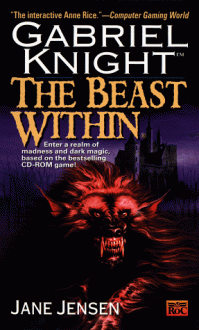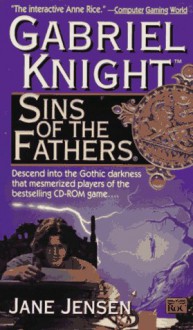
The events of the previous book/game left Gabriel Knight somewhat wealthy and in possession of a drafty castle in Germany. His writing career has finally taken off, but he's having trouble with his latest book, so the werewolf case that the local villagers bring him is a welcome distraction. The police think the killings are being done by wolves that escaped from the zoo. Gabriel, who found a giant paw print at one of the crime scenes, feels differently. His investigation gets him involved in a private hunting club whose members appear to have a lot of secrets.
Meanwhile, Grace has gotten tired of being Gabriel's shopkeeper. She put off getting her PhD for Gabriel and his supernatural investigations, so she's darn well going to make him involve her in his latest case. She flies off to Germany and, since Gabriel's off doing his own thing, devotes herself to the research she's so good at. She discovers that Gabriel's current case may have its roots in the events surrounding King Ludwig II's apparent descent into madness and his mysterious death.
The first book, Gabriel Knight: Sins of the Fathers, managed to be both terrible and enjoyable, even though I'd never played the game. I had played The Beast Within but never finished it, so I was especially looking forward to this novelization. Unfortunately, it turned out to be a disappointment.
I will say this: it was nice to finally learn how the story ended. I can't remember if I got stuck during the chase in the forest or the chase at the opera, but I do know that I died a lot and finally just couldn't take it anymore (this was in the days of slow phone-line-hogging internet, so I probably didn't look for a walkthrough). This was a much less stressful way to get the whole story.
And that story was kind of amazing. Jensen wove together a hunting club that was engaged in various illegal activities, Ludwig II, Wagner, opera, and gay (or possibly bisexual) werewolves. How often do you get to read something in which opera literally helps save the day?
I remember liking the original game a lot. I vaguely recall having some problems with the characters and story, but they were generally overshadowed by my enjoyment of the well-integrated puzzles, gorgeous locations, and impressive-looking cutscenes (or at least they were impressive to the me of the late '90s).
Unfortunately, The Beast Within's novelization left a lot to be desired. Unlike the Sins of the Fathers novelization, it felt a lot more like an original novel than a game novelization, but this didn't turn out to be a good thing. I kind of missed the cheesy/silly “game logic” moments. Sure, Gabriel made use of his trusty tape recorder a little more than was believable, and he still picked up the occasional random item that he didn't immediately know would be useful, but he rarely did truly off-the-wall stuff like using mud from a freaking river bank to make a usable bracelet mold.
The most off-the-wall thing Gabriel did was talk to people and actually expect them to tell him what he wanted to know. And sometimes they did! He was completely out of his element in Germany – hardly any contacts, no German language skills, little-to-no knowledge of the country. The main thing he had going for him was the Ritter family name and the money he had leftover from the fistfuls he grabbed at the end of the previous book/game. I suppose you could say game logic was in play any time anyone took him into their confidence.
Gabriel managed to be slightly more annoying this time around. He was painfully American in his lack of knowledge about anything around him (Grace was more prepared to visit Germany than he was), and he somehow still managed to find time to ogle the ladies (including a weird scene in which Von Glower, the head of the hunting club, basically let him borrow his girlfriend for sex).
Grace was a huge disappointment. She was underutilized in the previous story, so I thought her having a larger role would be an improvement. However, her instant jealousy and cattiness towards Gerde, who she assumed Gabriel was sleeping with, made it hard to like her. Grace and Gabriel weren't a couple, he hadn't even treated her all that well in the previous book, and Gerde had done literally nothing other than exist to indicate that she and Gabriel were together. If Grace was going to be mad at someone, it should have been Gabriel...but he wasn't around and refused to tell her where she could find him. I could maybe see the allure of being a supernatural investigator and putting up with Gabriel for that reason, but I couldn't understand Grace's romantic interest in him.
You know who Gabriel did have chemistry with? Von Glower. Jensen had a few missed opportunities in this book, all of which had to do with character sexuality. Several characters were identified as being gay, when it might have been more accurate to say at least one of them was bisexual. Gabriel was almost magnetically drawn to Von Glower, who he described as having “effortless charm” (134) and “shoulders broad enough to take on the world” (219). It wouldn't have taken much to write Gabriel as bisexual as well. Instead, Jensen tried to set Von Glower up as a father or older brother figure and threw in the girlfriend-sharing to remind readers that Gabriel was a bit of a womanizer. Bah.
Anyway, most of the big adrenaline-filled moments near the end of the book wouldn't have needed to happen if Gabriel hadn't
been so caught up in Von Glower. Gabriel saw nothing wrong with his instant acceptance of him and confided in him to an extent he hadn't confided in Grace in the previous book. Von Glower, too, was kind of silly, going on a dangerous mission with Gabriel, who refused to carry a gun and was on a horse he didn't know how to ride.
I was hoping for some of the same “so bad it's kind of good” fun of the previous book, and instead I got something that was just bad. It was nice to finally find out how the story ended, years after getting stuck in the game, but can't recommend this book for any other reason.
(Original review posted on A Library Girl's Familiar Diversions.)

 Log in with Facebook
Log in with Facebook 






